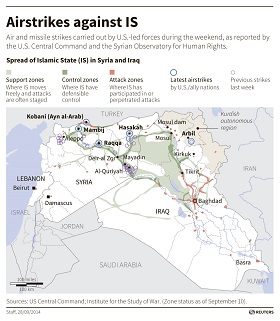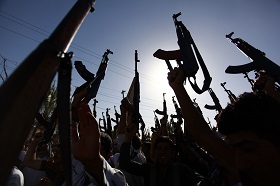The frantic activity of the Islamic State and the growing number supporters of extremist actions are causing alarm and anxiety in the West. The unabated conflict in Syria and fragile internal situation in Iraq are creating fertile ground for a strengthening in the position of the Islamic State. What will the West, particularly the United States, do next? Will the current alliances in the Middle East undergo any changes? Vitaly Naumkin, Doctor of History, Professor and RIAC member, Director of the RAS Institute of Oriental Studies, shares his insights on the situation.
The frantic activity of the Islamic State and the growing number supporters of extremist actions are causing alarm and anxiety in the West. The unabated conflict in Syria and fragile internal situation in Iraq are creating fertile ground for a strengthening in the position of the Islamic State. What will the West, particularly the United States, do next? Will the current alliances in the Middle East undergo any changes? Vitaly Naumkin, Doctor of History, Professor and RIAC member, Director of the RAS Institute of Oriental Studies, shares his insights on the situation.
Will the fight against the Islamic State reshape the current alliances in the Middle East?
Hypothetically speaking, the fight against the Islamic state could result in reforms to the system of alliances. However, it is somewhat premature to expect this with any certainty, since the countries that have joined the United States in this struggle, had already been Washington’s allies or coordinated their foreign policy activities with it. These, above all, are the Arab states of the Persian Gulf, namely Saudi Arabia, Bahrain and others. Speaking about countries in the West, Barack Obama in his address to the UN General Assembly noted that 40 nations had offered to join this coalition. In fact, very few of these 40 are really involved in the fight, if not the war with the Islamic State.
If we are talking about reformatting alliances, there is always the issue of Syria. How can the attitude of countries working closely with the United States and the US position in relation to Bashar al-Assad’s regime change? Currently, there is no indication that the United States or its coalition allies are willing to accept Bashar al-Assad as a partner in the fight against the Islamic State, and their readiness to do so seems is far from likely. Despite the fact that the coalition and Syria are both interested in opposing the Islamic State, the United States and its allies continue to regard Bashar al-Assad’s regime as unacceptable and want to overthrow it.
In your opinion, what are the prospects for the development of the Syrian crisis in light of possible US military action or taking the fight to the militants on Syrian territory?
It all depends on further developments. Many analysts and politicians are suspicious that apart from attacks on the positions of the Islamic State, the United States will deliver strikes on Syrian government forces. I doubt this will happen, because it is not in the interests of the United States today. The fact is that it is impossible to gain a victory over the Islamic State with air missile and bomb strikes alone. To make the victory decisive, land forces have to intervene by all means. All the more so, as the number of people in the Middle East who support the Islamic State is not decreasing, but instead is on the rise. Moreover, any bombardment leads to losses among the civilian population, which radicalizes local societies even further. Air strikes are becoming more intense, since a number of European and Arab states have joined the Americans, but only the Syrian government forces, the Kurdish militia Peshmerga and the Iraqi army are ready to fight the Islamic State on ground. The allies’ support in this regard is unlikely to go beyond military aid, arms supplies, financial assistance, and so on.
The Syrian regime faces a difficult situation. On the one hand, it has to fight on land with a very powerful and strengthening Islamic State, while air strikes on the former’s positions are delivered by an unfriendly coalition led by the United States. On the other hand, US air strikes against the Islamic State objectively align with the interests of Bashar al-Assad. Therefore, the international community should unite its efforts not only in the fight against the Islamic State, but also in promoting a national dialogue in Syria. Reconciling Bashar al-Assad with the moderate opposition inside the country would contribute to stabilizing the situation in that country and in the region.
Should we expect the rise of Islamist groups in different regions of the world?
The rise of Islamist groups in different regions of the world is already happening. Today, many Islamic organizations, including those which no one has ever heard of before, are declaring either support for the Islamic state or their affiliation with it. It is not always clear what these groups really are. Take, for example, the Khorasan Group which emerged out of nowhere and with which the Americans are fighting today, just as they are with the Islamic State. It is rumored that there is a serious conflict between the Islamic State and the groupings associated with Al-Qaeda or affiliated with it. Many units have already defected to the Islamic State. Therefore, we might see an expansion of the range of radical Islamist International, which covers North Africa and the countries of the Levant and the Arabian Peninsula, where groupings like al-Qaeda in the Arabian Peninsula are operating, with its jumping-off ground in Yemen or Al-Qaeda in the Islamic Maghreb with strong positions in north Africa and the Sahel.
How has the rise of the Islamic state influenced the situation in Iraq?
The rise of the Islamic State has severely aggravated the situation in Iraq. What other conclusion can we arrive at, if the area that the Islamic state controls today in Iraq and in Syria is more than the territory of Great Britain? Moreover, the Islamic State has managed to establish a certain level of order in the area under its control, revive economic life and gain the sympathies of the majority of the population, which it controls by ironfisted methods. The attractiveness of the Islamic State for a certain segment of the population is obvious. Many former military officers and officials of Iraq under Saddam Hussein have joined the ranks of its supporters, which makes the Islamic State particularly dangerous and its challenge to the Iraqi statehood quite tough. There is, maybe, one positive aspect, since the common threat has brought together former opponents. The federal government in Baghdad and the Kurds in the Kurdistan Regional Government in northern Iraq have, for the time being, put aside their long-standing confrontation that had divided them for a long time and are closely cooperating in the fight against the Islamic State.
How does Washington's decision at the beginning of the military action in Syria coincide with the refusal of the United States to send troops to fight the Islamic State in Iraq?
So far, the United States has pursued the same strategic line, that is, bombardment by aircraft and missiles of Iraqi territory, and now of Syria too. The area of air strikes is likely to expand. I would like to emphasize once again, that such air strikes alone cannot ensure a decisive victory, so the Americans will have to resort to outsourcing. They will rely on others’ ground forces to fight against the Islamic State. They realize that ground operations can be carried out by the Syrian army and Kurdish troops, and therefore attach great importance to them. So I do not see here any serious contradictions. The matter at issue is the combat readiness of those who are fighting the terrible enemy on land today, and their ability to deal a final blow to Islamic State positions after the US air strikes. And the struggle for the hearts and minds of the peoples of the Arab East will be far more important.
Interviewer: Maria Gurova, RIAC Program Assistant






